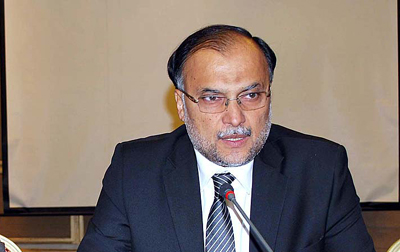Deputy Chairman of the Planning Commission of Pakistan Professor Ahsan Iqbal on Tuesday highlighted the importance of transitioning the entire Planning Ministry’s operations online to meet the demands of the modern era, terming “crucial” for ensuring transparency, preventing resource wastage and improving governance.
“We must focus on bringing all of the ministry’s operations online within a year,” he said while chairing a review meeting of ongoing development projects under the Ministry of Planning, Development and Special Initiatives.
Among others, the meeting was attended by Parliamentary Secretary for Planning Wajiha Akram, a news release said.
Ahsan Iqbal advocated for the inclusion of private sector consultants to enhance the performance of the Ministry’s ongoing projects, adding, “The expertise of the private sector will be instrumental in improving project management and execution.”
He also called for a critical review of ongoing projects, advising that those not contributing to governmental efficiency should be terminated.
He stressed the need for a more efficient and modernized approach to project planning and approval processes. “When approving new projects, their practical implications and expected outcomes must be thoroughly assessed. Ministries need to move beyond mere project initiation and focus on successful completion,” he added.
The Deputy Chairman also issued strategic directives for improving the Intelligent Project Automation System (iPAS) under the Ministry of Planning, adding iPAS should evolve into a comprehensive project management tool to ensure the highest level of efficiency in this key initiative.
As the government prepares for the next Public Sector Development Program (PSDP), Ahsan Iqbal underscored the importance of determining the availability of resources for projects initiated by various ministries. He reminded ministries to ensure that new projects are conceived within their allocated budgets.
“Project directors must take responsibility for hiring project staff, and every ministry must ensure that its projects are financially viable,” he added.
Ahsan Iqbal also stressed the critical role of the Pakistan Institute of Development Economics (PIDE) in supporting the government’s economic agenda, specifically through research on economic growth, governance improvements, and new project proposals.
“PIDE should serve as an economic think tank for the government, supporting the creation of sustainable projects that foster growth,” he maintained.
Addressing the importance of the China-Pakistan Economic Corridor (CPEC), Ahsan Iqbal highlighted that $25 billion in investment had already been made under CPEC and tasked PIDE with assessing the impact of this investment on Pakistan’s economy and business sectors.
“The CPEC Center of Excellence must be merged with PIDE at the earliest opportunity to ensure that we leverage our academic and research capabilities to track the benefits of the $25 billion investment,” he added.
Ahsan Iqbal further emphasized that PIDE’s research should benefit stakeholders across federal ministries and government institutions.
He remarked that the development of PhD professionals to serve the public sector is a fundamental responsibility of PIDE, and all federal ministries are its primary stakeholders.
“PIDE’s research must provide tangible benefits to its stakeholders. We need to strengthen our governance frameworks through evidence-based research,” he remarked.




